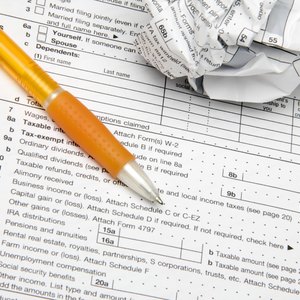
When it comes to taxes, no income earned from a job is exempt. Even if your employer hands you a wad of cash at the end of each pay period and doesn't withhold taxes, you have a responsibility to report that income to the Internal Revenue Service on Form 1040.
If you are ready to file taxes and you have been paid in cash, you need to figure out whether you're an actual employee or an independent contractor. This status designation will significantly influence how you report this income and how it is taxed. Read on to learn more about filing taxes on cash income.
Understanding Worker Status
The distinction between an employee and an independent contractor determines how you file taxes and what taxes you need to pay. The IRS uses three categories: behavioral, financial and relationship of the parties to determine who's an employee and who's a contractor.
Typically, if your company tells you how to work and where to work, you're an employee. If you're an employee, your employer needs to withhold taxes from your pay and also needs to pay unemployment, Social Security and Medicare taxes.
While some companies try to skirt the issue, your employer shouldn't pay you in cash and expect you to figure out the taxes. If you're an independent contractor, you are on your own when it comes to taxes and usually need to pay estimated quarterly taxes four times a year.
Fill Out Schedule C
If you qualify as an independent contractor, you need to complete Schedule C, "Profit and Loss From Business," when you file your taxes. The company you work with should send you a Form 1099-NEC, but is only required to do so if you earned more than $600 during the year, even for cash jobs. Otherwise, it's up to you to keep track of and report all the income you've received over the course of the year.
One benefit of filling out Schedule C is that you can subtract business expenses from your income, such as insurance, mileage and travel related to your work.
It's also possible that you worked a 9-5 job as an employee and then a few odd jobs for cash on the weekends as an independent contractor. In this case, your tax return will have both the reported wages from your regular job and a Schedule C with the cash income information from your side jobs.
Don't Forget Self-Employment Tax
When you're an independent contractor who is paid cash, income tax filing requires meticulous record-keeping. Regardless how you're paid, you're responsible for the full amount of your Social Security and Medicare taxes. In a typical employee-employer relationship, you pay half and the employer pays half. You need to pay the tax on any income you earned over $400.
Fill out Schedule SE when filing your taxes to calculate your tax. While paying self-employment tax can raise your tax bill quite a bit, you can deduct half of the tax from your total income.
If You've Been Misclassified
Things can get a bit complicated if the company you work for treats you as an independent contractor when it should treat you as an employee. In that case, your employer can't legally pay you cash and expect you to handle all the tax issues yourself.
References
Writer Bio
Based in Pennsylvania, Emily Weller has been writing professionally since 2007, when she began writing theater reviews Off-Off Broadway productions. Since then, she has written for TheNest, ModernMom and Rhode Island Home and Design magazine, among others. Weller attended CUNY/Brooklyn college and Temple University.

